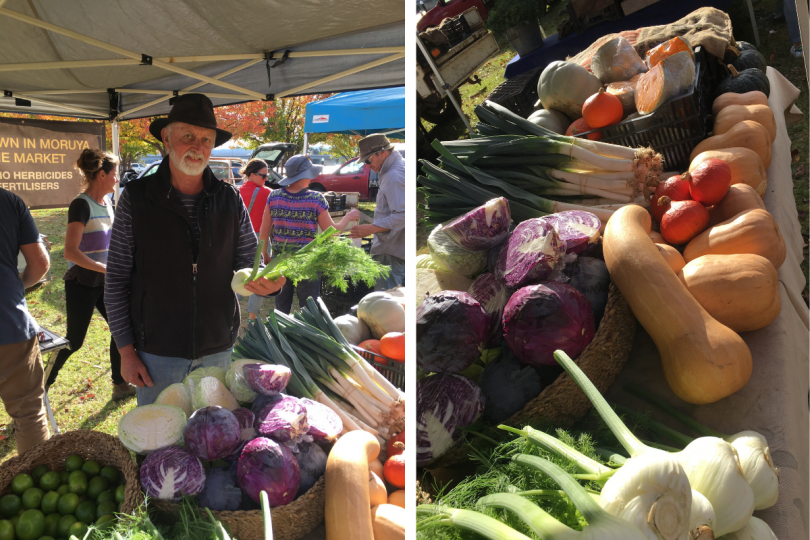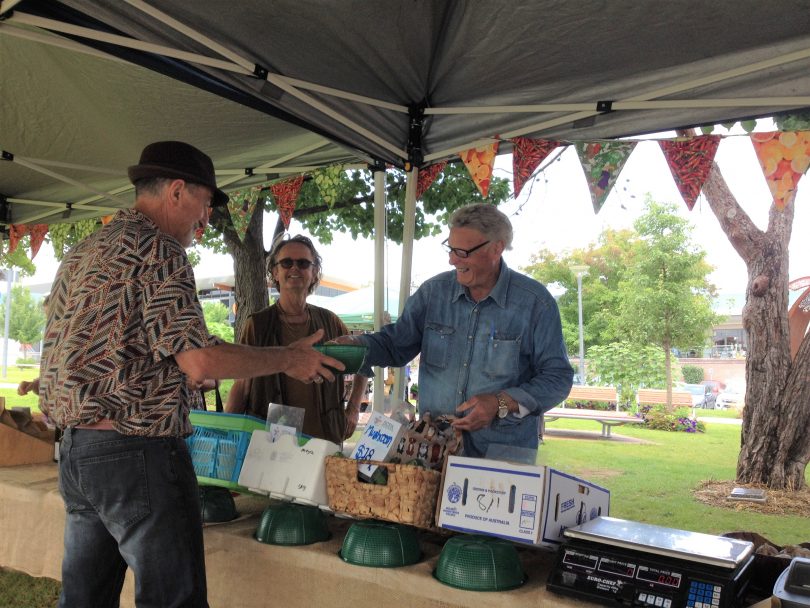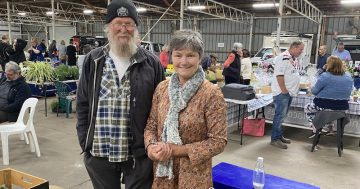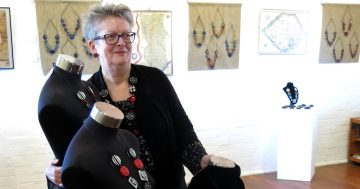
Stuart Whitelaw shows off the fresh produce on offer at SAGE Farmers Market in Moruya. Photos: Supplied.
Farmers’ markets are becoming an increasingly common place for NSW South Coast locals to buy their fresh produce, with both Moruya and Bega’s weekly events reporting increases in trade.
A recent economic impact study by SAGE Farmers Market in Moruya claims it received a 28 per cent jump in sales in five years, and delivered a combined economic benefit to vendors, local businesses and the community of more than $4 million in 2019-2020.
“Considering the past 18 months [due to COVID-19] it’s been pretty incredible really,” says SAGE Farmers Market committee member Stuart Whitelaw.
“We were blown away by the numbers and the fact the market has grown at nearly double the rate of the Eurobodalla economy.”
Interestingly, there was not a large increase in the number of people attending the market, but the amount of money its customers were spending had gone up.
“We believe the increased spend per customer tells us that our regular shoppers have become more familiar with how to shop at a farmers’ market, and cooking with local seasonal produce,” says Stuart.
“More people are doing more of their weekly shop at the market.”
Further south, Bega Produce Market coordinator Sue Hill also believes her market, which has run in the town for more than 15 years, has grown.
She says the mood in the local community has changed towards farmers’ markets, with people wanting the experience of a market as well as local, sustainable food.
She adds that after the devastating Black Summer bushfires, locals are looking into climate change and the transportation of food. All of Bega Produce Market’s food comes from within 250km.

Paul McMurry serves customers at Bega Produce Market.
“We have regulars every single week and it’s because they want to support food security,” says Sue.
“We see our market as a really vital part of transitioning into a more climate-friendly economy. Our food has a low carbon footprint.”
Stuart and Sue say after the SAGE Farmers Market in Moruya was started in 2013 there was originally some pushback from local businesses, but they now report making extra sales when the markets are on.
In their survey, 44 per cent of local businesses said they had an average of 36 per cent increase in trade on Tuesday afternoons [when the market is held] from marketgoers.
Stuart says some shops even reported they had to employ an extra staff member because they were so busy.
Sue says there was some resistance from nervous local shop owners when Bega Produce Market first started.
“But [the market] brings people to town,” she says.
Stuart says marketgoers love the fact the seller behind the table is the person who grew the food. Also, the wide variety of produce available at the market – from vegetables to dairy to meat – allows customers to do a weekly shop.
“We just really want to provide everyday people with the food they need to eat for the week,” says Stuart.
“I think there’s a misconception that farmers’ markets are more expensive and are more of a trendy thing. But that’s not something we try to build on at all – we’re trying to go in the opposite direction.
“We want to meet supermarkets on equal terms. We want the price to be on parity.”
Sue believes that in general, people love the experience of a farmers’ market.
Markets help people who want to use as little waste as possible in their lives. Most of the produce for sale is chemical free and customers can “put a face to the grower”, she says.
“You are also supporting the local economy, and especially after what we’ve been through with the bushfires and COVID-19, that’s a big part of people’s lives now,” says Sue.
SAGE Farmers Market opens at 3:00 pm every Tuesday at Riverside Park in Moruya, and closes at 5:00 pm. For more information, click here.
Bega Produce Market is held every Friday from 8:00 am to 1:00 pm at Littleton Gardens in Bega. For more information, click here.










